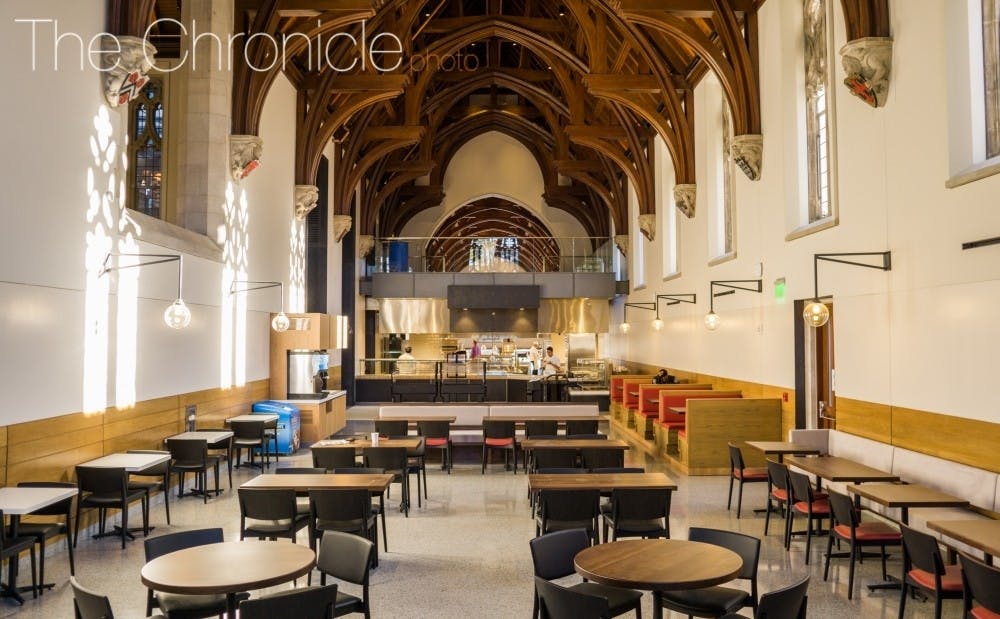Maybe the taboo is finally broken. Not only do students with low socioeconomic status (SES) exist on campus, but we have a voice, too.
I have spent much of my Duke experience coming to terms with my status as a low SES student. Duke’s campus serves a constant reminder of wealth (and lack thereof)—from the $95 million restoration of West Union over my first year to the annual four percent increase in tuition to the $8.5 billion endowment that Duke proudly displays at any and all opportunities. Due to the juxtaposition between Duke’s commitment to parading its expansive wealth in front of the world and my financial background, I often feel isolated living in this type of environment.
However, it is not just the institution itself that creates these feelings of solitude. In fact, I find that I normally experience the largest insecurities surrounding my financial status when spending time with peers. Let’s face it—49 percent of Duke students are able to pay the full, ever-increasing price of attending this university. The median household income of Duke students sits at around $186,700. About 20 percent of Duke students have families who make over $630,000. Over 70 percent of Duke students have families who make over $100,000. And then there’s me, and my family’s annual income, which places me in a bracket with approximately the bottom four percent of Duke students.
The vacations I cannot take, the meals I cannot eat off campus, the books professors require without a second thought, the extra work shifts I need to pick up because I am always thinking about what I will need to purchase next. The awkward dinners where friends boast about their extravagant travel, the burden of knowing that laundry cannot be covered by my generous financial aid donors, the extensive research and application processes to apply for summer grants to be afforded the same opportunities as many other, wealthier students on this campus. The uncomfortable conversations where food points are not considered “real money” even though I depend on them to eat, the brushing off of comments that “I am so lucky” to be on full financial aid without confronting what it actually means, the quiet shrug when people question why I work so many jobs. These are the realities of a low SES Duke student. Not just on the weekends, or in one class, or in one social organization, but every day at a university that mutes dialogue which actively challenges the perception of low SES students.
Many of us share these experiences of embarrassment, shame and discomfort. Of stress, anxiety and uncertainty. So, we should not tear each other down when we all struggle with certain aspects of being a low SES student. We should not assert our financial burden over burdens that impact other students. Instead, we should validate our peers’ personal challenges of existing on a campus where low SES identities are often neglected. We should say “yes, and…” to validate that low SES status impacts you and me in similar and different ways. We should stand together to amplify our voices to bring a greater understanding to students who cannot empathize with the struggles of being a low SES student at Duke.
I will admit it: I am guilty. I am guilty of hearing a prestigious private high school that my peers attended and rolling my eyes without a second thought. Of stereotyping certain groups of people based on their perceived wealth. Of assuming the worst intentions of those I know who come from an extremely wealthy background. I am actively working to change these reactions, although it is not easy, because I know it is not fair to judge my peers based on their income bracket.
On the other end, however, I am not guilty of poor budgeting. Or prioritizing my social life over the legitimate financial burdens I face as a low SES student. Or spending irresponsibly. Or invalidating the struggles of other low SES students on this campus. And I do not deserve to be judged or invalidated based on my income bracket, either.
It has taken me four years to come to terms with this part of my identity on campus and find my voice; to confront my struggles and incorporate these lived experiences into who I am. I am proud of the low SES community which has started to raise its voice, and I can only hope that this dialogue persists and develops so that we normalize and validate our peers regardless of their financial background coming into Duke.
Tyler Goldberger is a Trinity senior.
Get The Chronicle straight to your inbox
Signup for our weekly newsletter. Cancel at any time.

